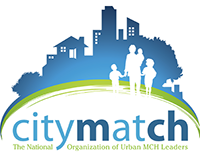Executive Summary
Racial and ethnic disparities in health status persist and are even increasing in some areas. Eliminating health disparities is a sustained, strategic priority of CityMatCH, a national public health organization dedicated to improving the health and wellbeing of urban women, children and families. Although public health is a relative newcomer to the field of “undoing racism,” CityMatCH’s local health department members have requested the organization become involved in examining the role of, and “undoing,” institutional racism in the very structure of how public health is administered.
Racism and discrimination are social constructs of attitudes, beliefs, behaviors and practices that contribute to these long standing disparities. Racism affects health through a complicated set of direct physiologic effects, most notably physiologic stress, and through indirect pathways such as access to goods, services and opportunities. Analysis of such effects has proven difficult, in part because race and racism are difficult to quantify, in part because of the intricate interconnections between the various pathways. Further, there is growing consensus among researchers that the health effects of racism and race-related exposures and experiences accumulate over a lifetime, and can not be pinpointed to single points in time.
Consideration of institutional racism moves beyond beliefs and behaviors to the deeply engrained structural and systemic factors and policies that affect individuals’ health. Institutional policies affect health care and thus health status through three main areas – logistical as well as cultural access to care, the quality of care that is provided, and the scope and relevance of that care. Organizational policies and attitudes that result in different levels of access and quality of service to different populations, or that assume that all clients have the same scope of needs, are major contributors to persistent health disparities. For instance, housing location and quality are acknowledged to impact health status yet are rarely addressed in public health programs. Activities such as cultural competence training that improve linguistic and cultural access to care may improve that care for individuals, but are unlikely to create needed long term, fundamental changes in population health status.
CityMatCH member health departments are already engaged in a variety of activities designed to improve their cultural competence and reduce health disparities, but are on the whole uncomfortable with directly addressing individual or institutional racism. However, there is a wealth of existing programs and organizations that can assist members with anti-racism education, awareness and change at the individual or organizational level. Their products vary from having a broad community focus with coalition building around specific areas of need, to those with a primarily institutional focus. There is thus considerable opportunity for health departments to choose intervention strategies and programs that best fit their institution’s and community’s perspectives and needs. Underpinning the more rigorous programs are the tenets that the work may be painful, that without fundamental organizational commitment change will only be cosmetic or superficial, and that to be meaningful the work must be seen as an on-going, long term commitment.
A query of CityMatCH members and evaluation comments from state health department teams participating in a workshop on health disparities reveal four potential areas of focus for a large-scale, national initiative on undoing racism in public health. “Making the Case” would develop and disseminate health department-focused introductory materials on institutional racism, promote new research results and programmatic activities, and integrate undoing racism information into CityMatCH’s existing activities and models. “Cross-Community Networking” would convene teams of health departments willing to engage at one or more levels in developing undoing racism tools and frameworks, including a compendium of best practices. A “Practice Collaborative” would again involve teams working together to overcome specific barriers and supporting members’ undoing racism activities. Finally, “Changing the External Landscape” would involve collaboration with other national public health organizations to bring the issues of institutional racism and health to the forefront of the national public health community.

